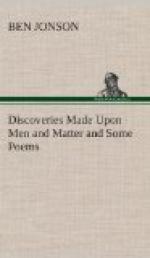Amor nummi.—Money never made any man rich, but his mind. He that can order himself to the law of Nature is not only without the sense but the fear of poverty. O! but to strike blind the people with our wealth and pomp is the thing! What a wretchedness is this, to thrust all our riches outward, and be beggars within; to contemplate nothing but the little, vile, and sordid things of the world; not the great, noble, and precious! We serve our avarice, and, not content with the good of the earth that is offered us, we search and dig for the evil that is hidden. God offered us those things, and placed them at hand, and near us, that He knew were profitable for us, but the hurtful He laid deep and hid. Yet do we seek only the things whereby we may perish, and bring them forth, when God and Nature hath buried them. We covet superfluous things, when it were more honour for us if we would contemn necessary. What need hath Nature of silver dishes, multitudes of waiters, delicate pages, perfumed napkins? She requires meat only, and hunger is not ambitious. Can we think no wealth enough but such a state for which a man may be brought into a premunire, begged, proscribed, or poisoned? O! if a man could restrain the fury of his gullet and groin, and think how many fires, how many kitchens, cooks, pastures, and ploughed lands; what orchards, stews, ponds and parks, coops and garners, he could spare; what velvets, tissues, embroideries, laces, he could lack; and then how short and uncertain his life is; he were in a better way to happiness than to live the emperor of these delights, and be the dictator of fashions; but we make ourselves slaves to our pleasures, and we serve fame and ambition, which is an equal slavery. Have not I seen the pomp of a whole kingdom, and what a foreign king could bring hither? Also to make himself gazed and wondered at—laid forth, as it were, to the show—and vanish all away in a day? And shall that which could not fill the expectation of few hours, entertain and take up our whole lives, when even it appeared as superfluous to the possessors as to me that was a spectator? The bravery was shown, it was not possessed; while it boasted itself it perished. It is vile, and a poor thing to place our happiness on these desires. Say we wanted them all. Famine ends famine.
De mollibus et effoeminatis.—There is nothing valiant or solid to be hoped for from such as are always kempt and perfumed, and every day smell of the tailor; the exceedingly curious that are wholly in mending such an imperfection in the face, in taking away the morphew in the neck, or bleaching their hands at midnight, gumming and bridling their beards, or making the waist small, binding it with hoops, while the mind runs at waste; too much pickedness is not manly. Not from those that will jest at their own outward imperfections, but hide their ulcers within, their pride, lust, envy, ill-nature, with all the art and authority they can. These persons are




